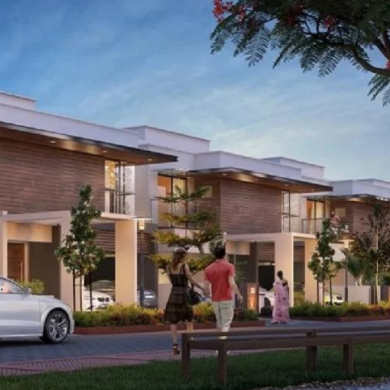
Buying a home is a significant choice. Finding your perfect home can sometimes take months or even years. When you eventually manage to close the transaction after a protracted market analysis, keep in mind to properly read the sale agreement before signing at the bottom of the page. The agreement will bind you after you sign it, and you won’t be able to object to anything in it beyond that point. It is important to remember that a selling agreement is not a typical contract and that there may be stipulations that might get you into difficulty. For this reason, it is advised to carefully review the agreement.
Table of Contents
What is Builder Buyer Agreement?
A contract between a builder and a buyer is known as a builder-buyer agreement. It outlines the circumstances under which a builder will complete a structure or piece of property for a customer. The purchase price, delivery date, terms of payment, specs, and other information pertaining to the construction project are often covered.
Importance of Builder Buyer Agreement for Homebuyers
To ensure that the homebuilding process is completed as per the buyer’s expectations, homebuyers should sign the Builder Buyer Agreement. The contract describes the precise rights, duties, and demands of both the builder and the buyer. It aids in shielding the purchaser from any controversies or misunderstandings that can develop throughout the development process. Additionally, it lays forth the precise terms and conditions that must be followed by both parties during the entire construction process. This guarantees that the builder will be paid for their labour and that the buyer will obtain a quality home that fits their requirements. The Builder Buyer Agreement is a binding contract that needs to be thoroughly reviewed before being signed.
Things to Check Before Signing a Builder Buyer Agreement
-
Assessment of the Builder’s Credibility:
It’s crucial to confirm the builder’s credibility before signing a builder-buyer agreement. To be sure you are doing business with a respectable builder, look into the builder’s prior work, client testimonials, and other readily available information.
-
Payment Terms:
Carefully read the payment conditions, which include the project’s overall cost, the payment schedule, and any other costs, before signing a builder-buyer agreement. Verify that the payment terms are specified in detail and that you comprehend them.
-
Inspection and Warranty:
Be sure to review the inspection and warranty clauses before signing a builder-buyer agreement. Verify that the builder is prepared to offer a warranty for any flaws or fixes that may emerge after the project is finished.
-
Contract Clauses:
Carefully read through all of the contract clauses before signing a builder-buyer agreement. Be sure you comprehend every clause, particularly the ones about zoning, construction permits, and any other conditions that might be necessary for the project.
-
Legal Advice:
To make sure you are fully aware of all of the terms of the contract, it is advised you have legal counsel before signing a builder-buyer agreement. This will assist in defending your interests.
Builder Buyer Agreement Before RERA
Builder-buyer agreements were almost always biased in favour of the builders before the RERA went into effect. A typical builder-buyer contract might include clauses requesting 20% interest if the buyer failed to make payments on time. If the builder didn’t finish the project by the deadline, he would be penalised with 2% interest.
-
Construction Schedule
Typically, the contract would say that the builder will give the flat to the buyer within 36 to 42 months following the “start of construction.” The agreement makes no mention of the fact that this period began on the day of the reservation. The builder would have complete control over when to begin building. Some builders felt free to wait until the excavation work was finished before claiming that the building had begun. -
Clause of Price Increase
This provision allowed developers to increase the price of the property as and when necessary. Even if a project was delayed, they could still increase the price by arguing that the cost of raw materials and other inputs had gone up. The buyer was powerless to stop the double whammy of increased expenses and delays.
-
Changes in Dimension
The contracts also contained a provision permitting the builder to alter the apartment’s square footage. In the event of an increase, builders may request additional payment from the customers.
-
Payment Delay
Builder-buyer contracts also featured a penalty provision that would be activated if the purchaser missed an instalment payment. The fee could be high—up to 18%–24%, compounded quarterly. Other builders went a step further and included terms giving them the authority to revoke the allocation and keep the earnest money, which could be as much as 20%–25% of the final price if the buyer delayed payment for an extended period. The remaining amount would be refunded, interest-free.
-
“Real cost basis” Payments
The agreements further stated that upon taking possession, the buyer would be responsible for paying for several amenities on an actual cost basis. If the builder asked for an unforeseen high sum for amenities like a club membership, energy connection fees, etc., the buyer would then be in for an unpleasant surprise. In a similar vein, the PLC would not be specifically mentioned at the time of booking (preferential location charges). This fee could be tacked on at the last minute, depending on what the builder thought fit.
-
Modifications to Building Plans in Builder-Buyer Agreements
Builder-buyer agreements are frequently constructed by developers in a way that gives them complete legal flexibility to alter the building’s blueprints without incurring any penalties.
-
Transfer Fees in Developer-Buyer Contracts
If the flat was resold before the buyer took possession, this condition in contracts used to stipulate that the buyer was required to pay the developer a “transfer charge.” Nevertheless, no information was provided on the type of payment the customer would need to make.
Builder Buyer Agreement After RERA
Before you sign the builder-buyer agreement, thoroughly read it and understand it. This is the only contract that will support you in court in the event of taking legal action.
The Real Estate (Regulation and Development) Act of 2016 established guidelines for designing and implementing builder-buyer agreements, also known as agreements to sale, to address the fact that such agreements that favoured builders were a major source of suffering for the buyer community. According to the legislation, a contract made between the promoter and the allottee is referred to as an agreement for sale.
-
While registering his project with the RERA, the builder is required to provide a Pro-forma of the sale agreement
A builder is required to present the pro-forma of the allotment letter, agreement for sale, and conveyance deed scheduled to be executed with the buyers together with his application and other supporting papers when registering a project.
-
Earnest Money Clause
After the builder-buyer agreement is signed, the developer may not demand from the buyer more than 10% of the property’s worth. The agreement between the parties must be recorded for it to have legal standing.
-
Lack of Provision of Facilities Promised
A builder is required by law to furnish any amenities that were promised in the builder-buyer agreement. If he does not, the buyer may notify him of this within five years after taking ownership, and he will have one month to correct the error. Also, the allottee is entitled to compensation if the promoter doesn’t fix errors within the allotted period.
-
The Governing Document is the Builder-Buyer Agreement
According to the law, the builder is required to fulfil his obligations as outlined in the purchase agreement.
-
A builder-Buyer Agreement’s Specifics
According to Section 13 (2) of the law, the builder-buyer agreement must include every single detail, leaving little room for doubt regarding the builder’s obligations.
-
Charges Involved in Registering Builder Buyer Agreement (BBA)
Among the expenses connected with enrolling for a BBA are:
– Fees associated with submitting the agreement to the relevant government body.
– Costs associated with documenting the agreement with the relevant government body.
– Lawyer’s fees
Builder Buyer Agreement Format
After the RERA, builders are required to create and complete the builder-buyer contract by the guidelines established by the house buyer-specific law. Several Indian courts have emphasised this issue repeatedly. This document lists all the specifics of the project’s deliverables and facilities. Also, it will serve as a reference for the rules that will apply in circumstances of either party’s default.
We have attached a sample format of the Builder Buyer Agreement in compliance with the RERA rules.
According to section 13(2) of the law, the builder-buyer agreement must include every little nuance. The details that should be given include:
• Development of the project
• Construction of buildings and apartments
• Specifications and internal and external development works
• Date of completion and possession
• Mode of payment
• Date of payment
• Rate of interest in case of default
• RERA registration
• Buyers’ right to cancel/assign the property
• Refund policy
• Any grace period taken by the builder
• Force majeure clause
• Consideration for the property and what is excluded (such as maintenance, parking, electrification charges, etc.)
• Property particulars like fixtures, clear title, jurisdiction/arbitration clause
This is all you need to know about the Builder Buyer Agreement.
The Process of Drafting a Legal Agreement Between a Builder and a Buyer
Drafting a simple contract outlining the sale’s conditions will probably be the first step taken by the builder and the buyer. The price of the house, the selling date, and the builder’s responsibilities to the buyer will probably all be included in this contract.
The agreement will then be discussed and revised by the builder and the buyer to address any particular issues or concerns that may arise. For instance, the builder’s warranty responsibilities, the buyer’s right to view the property, or the buyer’s right to call off the transaction, may fall under this category.
The builder and buyer will sign the agreement after it is complete, at which point it will be deemed a binding legal document.
Supreme Court Clarifies Legalities of Builder Buyer Agreement
A Public Interest Lawsuit (PIL) in 2021 called for a standard builder-buyer agreement across the country. The decision to create a model builder buyer agreement format that outlines the terms and conditions that must be included in that state’s real estate is currently up to the states. Nevertheless, the same is not adhered to on a state level. The PIL asks the federal government for a uniform structure that would apply to all the states, protect buyers’ rights, and firmly compel builders to adhere to RERA standards. The universal RERA builder-buyer agreement is awaited since the proceedings, in this case, are still underway.
Must Read: Importance of Occupancy Certificate and Completion Certificate
Common Issues
The following are some typical difficulties that might come up in a builder-buyer agreement:
- The quality of the building.
- When the building project will be completed.
- The project’s cost.
- The warranty’s conditions.
- The procedure for resolving disputes.
- Delay in possession
Tips for Home Buyers
Negotiating the Terms and Conditions
Firstly, read the agreement carefully and thoroughly. Don’t rush into signing the contract without understanding the terms and conditions. Make sure that you understand the payment schedule, delivery timeline, and any other clauses mentioned in the agreement. If there are any clauses that you don’t understand, seek clarification from the builder or your lawyer before signing.
Secondly, check for any hidden costs. Some builders may include hidden costs in the agreement, which can inflate the overall cost of the home. Make sure that all the costs, including the base price, taxes, stamp duty, registration charges, and other expenses, are mentioned in the agreement. If there are any hidden costs, negotiate with the builder to remove them or reduce them.
Research and Due Diligence
Thirdly, check the builder’s reputation and track record. Research the builder’s past projects, customer reviews, and complaints filed against them. Ensure that the builder has all the necessary licenses and approvals from the local authorities. This will help you understand the builder’s credibility and reliability and avoid any potential risks.
Seeking Legal Advice
Lastly, seek legal advice. It’s always advisable to seek legal advice before signing any agreement. Hire a lawyer who specializes in real estate law to review the builder-buyer agreement and provide their opinion. They will help you understand the legal implications of the agreement and ensure that your interests are protected.
Checklist for Buyers in Builder-Buyer Agreements
- RERA documentation
- Dates of the start and end of the project
- Right of the buyer to return or assign the property
- Refund procedures
- Any extension granted by the builder
- Clause of force majeure
- Taking into account the property and excluding certain things (such as maintenance, parking, electrification charges, etc.)
- Payment schedule
- Fixtures, a clear title, and jurisdiction/arbitration clause are examples of property specifics.
Final Thoughts
When it comes to buying a property, the builder-buyer agreement is an essential document that ensures both parties interests are protected. It is a legally binding agreement between the builder and the buyer that outlines the terms and conditions of the transaction. The importance of a builder-buyer agreement cannot be overstated, as it covers all aspects of the property purchase, from the payment schedule to the possession date.
One of the key advantages of having a builder-buyer agreement is that it provides clarity and transparency to the transaction. The agreement outlines the payment schedule, payment terms, and other details such as the amenities and facilities included in the property. This helps to avoid any confusion or misunderstandings regarding the transaction, ensuring a smooth and hassle-free purchase experience.
The builder-buyer agreement also offers legal protection to both parties. The agreement is a legally binding document, and any breach of the terms and conditions can result in legal action. This ensures that both the builder and the buyer are accountable for their actions, and any disputes can be resolved through legal channels.
Moreover, the builder-buyer agreement is crucial in protecting the buyer’s interests. It ensures that the builder delivers the property as per the agreed-upon specifications, and any deviations from the same can result in penalties for the builder. This helps safeguard the buyer’s investment and ensures they get what they paid for.
In conclusion, a builder-buyer agreement is a vital document that should not be overlooked by either party. It provides clarity, transparency, and legal protection, ensuring a smooth and hassle-free transaction. Whether you are a builder or a buyer, it is crucial to have a builder-buyer agreement in place to protect your interests and ensure a fair and equitable transaction.
FAQ’s
1. What is a builder-buyer agreement?
The terms established by a builder and a buyer about the delivery of one of the units in a builder's housing project are commonly referred to as a BBA or RERA builder buyer agreement. Conditions include things like carpet and super area standards, possession date, building layout, delivery delay, payment schedule, etc.
2. Can a builder cancel a purchase agreement?
The builder may legitimately cancel the sale if the builder-buyer agreement stipulates the conditions of such cancellation. One of the main causes for cancelling a builder buyer agreement registration is late or nonexistent payments after a few instalments.
3. What is a builder development agreement?
In a nutshell, a development agreement is a contract between a landowner and a developer, wherein the landowner agrees to give his property to the developer, who would then develop it using his funds. It indicates that the developer constructs over the property that the landowner supplies.
4. What are the buyer's remedies if the builder fails to deliver?
The homebuyer may approach RERA and complain against the builder in such circumstances.
5. How long is a builder liable for his work in India?
A builder or developer is required by Article 14(3) of the Real Estate Act to correct/repair any flaws brought to his attention by a homebuyer within five years of the date of ownership without additional cost.
6. Is a Builder Buyer agreement a legal document?
A builder-buyer agreement is legal.










